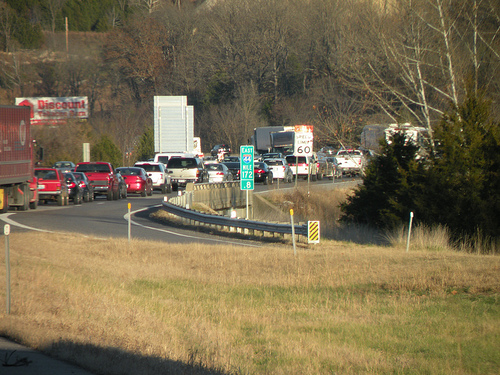Are Americans obese because they drive, or do they drive because they’re obese?
Call it America’s latest version on the old chicken/egg question: What came first, excessive driving or the country’s obesity problem? New research indicates that driving more than 10 miles a day hurts drivers both physically and mentally, as Business Insider reports. But this latest study is far from the only one to suggest driving has a negative impact on health. The bigger question, of course, is, do people drive because they are obese, or do they become obese because of their driving habits?

Image from Kristin Nador.
Researchers don’t have a solid answer, because obesity is too intertwined with other factors to pin the blame solely on driving habits — factors such as diet, genetics, income, and even mothers’ diets. But this recent study does highlight an important link between overall wellness and transit use. “The longer people spend commuting in cars, the worse their psychological well-being,” Adam Martin of the University of East Anglia in the UK notes (Martin worked with the Centre for Diet and Activity to analyze 18 years’ worth of information on almost 18,000 commuters for the study). “And correspondingly, people feel better when they have a longer walk to work.”
Obesity is a major public health concern. Almost 70% of American adults (and nearly one in three American kids ages 2-19) are overweight or obese, according to the American Heart Association. They face increased risks for heart disease, stroke, diabetes, high blood pressure, and more. Obesity costs big bucks, too: the estimate runs $190.2 billion yearly for healthcare costs associated with obesity-related illnesses, according to the National League of Cities. Obese drivers face other risks, including a high fatality rate — 78% — in car accidents, as the Berkeley School of Public Health notes.
An interesting 2002 study analyzed the relationship between car ownership and obesity in China, finding that the likelihood of being obese was 80% higher for men and women in homes which owned a motorized vehicle compared to those without a vehicle. That study offered some advice, too: “Encouraging active forms of transportation may be one way to protect against obesity.”
Another, more recent study at the University of Illinois discovered that, after analyzing national data from 1985-2007, the rate of annual vehicle miles traveled had a strong correlation with the annual obesity rate. “If every licensed driver in the country cut down on travel by just one mile each day, in six years the obesity rate would drop 2.16%—cutting down on the number of obese adults by almost 5 million people,” reported FastCo.
Until we solve this riddle, one solution is to opt for public transit. As researcher Martin puts it, “The most surprising finding was that public transport use improved well-being… Although we are not quite sure why this was the case, it could be that people find train or bus journeys more relaxing, with more chance to prepare for the day ahead, catch up with emails, take phone calls, or catch up with friends, for example.”
Related Posts
Category: Miscellaneous

















